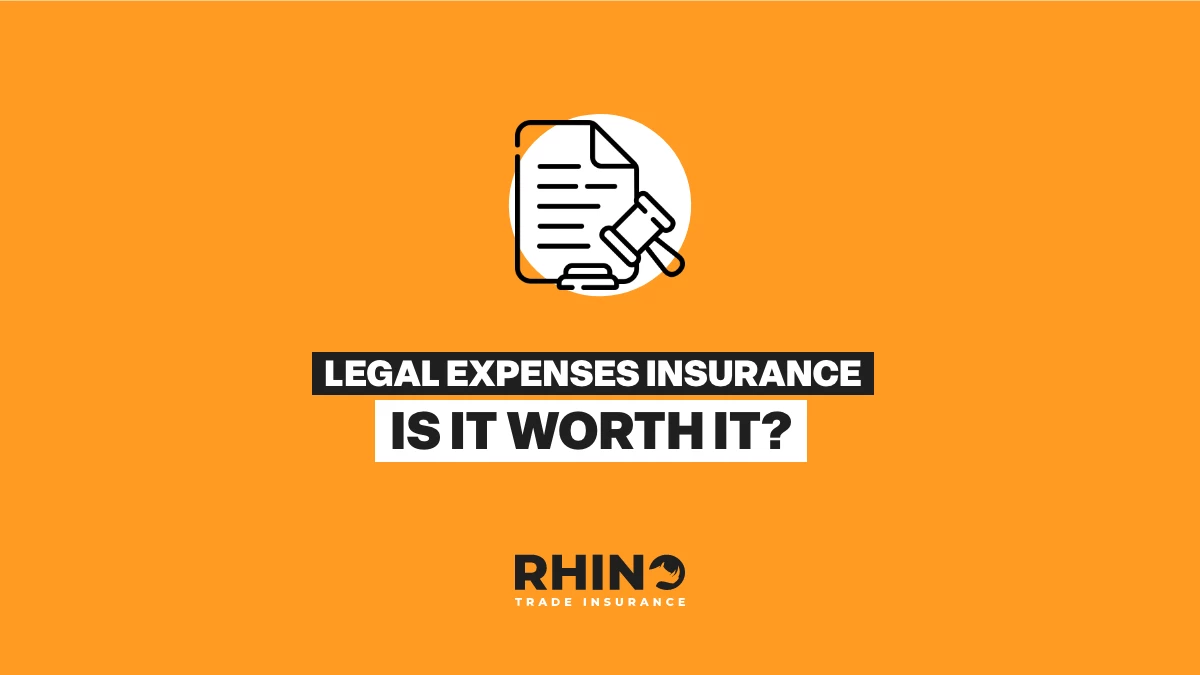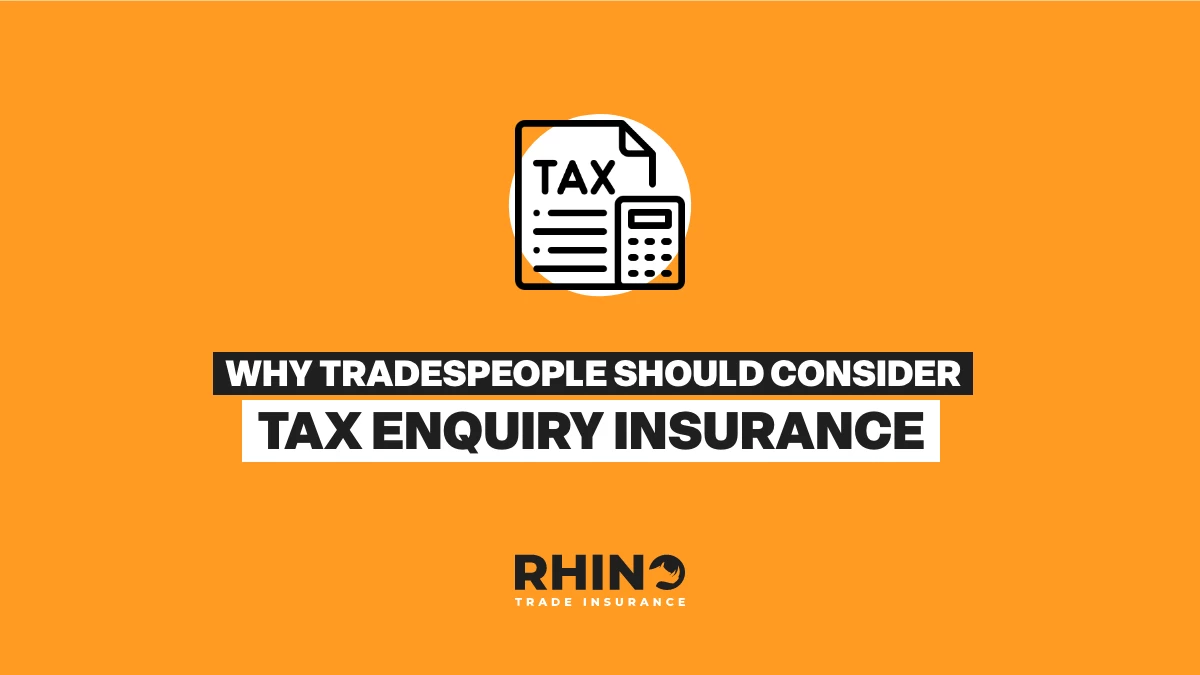
Legal Expenses Insurance – Is it Worth It?
Legal Expenses Insurance for tradespeople explained—what it covers, when you might need it, and how it protects against costly legal fees.
Whether you're a budding carpenter, electrician, plumber, or any other skilled craftsman, you're likely well on the way to becoming a successful tradesperson. And if you're anything like most people, insurance might not be the first thing on your mind when you're busy honing your craft and building your trade business.
But here's the deal: navigating trade insurance is a crucial aspect of your professional journey. It's the safety net that can save you from unexpected setbacks and ensure your hard work doesn't go down the drain. In this comprehensive guide, we'll break down the essentials of trade insurance, debunk some common myths, and help you make informed decisions that will protect you, your trade business, and your bottom line.
Let's start with the basics. Trade insurance, also known as tradesman/woman/person insurance, is designed to protect you and your business from a variety of risks that are part and parcel of the trade industry. From accidental damage to third-party injury claims, having the right insurance can mean the difference between a minor hiccup and a major financial setback.
Types of Trade Insurance:
This is the big one. Public Liability Insurance covers you if your work accidentally damages someone's property or injures someone. It's like having a forcefield that shields you from unexpected mishaps. Rhino is able to offer all budding tradespeople comprehensive cover ranging from £1 million to £5 million in liability.
If you have employees (even one part-timer or casual labourer), this insurance is a legal must-have in the UK. It covers you if an employee falls ill or gets injured while working for you.
Put simply, your tools are your livelihood and must be protected. This insurance covers replacing or repairing your tools and equipment if they're lost, stolen, or damaged. Want to protect your tools up to £7,500? Find out what we can offer here.
Ever had a project grind to a halt due to circumstances like fire, flood, or theft? That's where Contractors' All Risks Insurance swoops in to save you by covering the costs of repairing or redoing the work.
Mistakes happen, even to the best of us. This trade insurance protects you if a client claims that your work, advice or guidance has caused them financial loss.
What if you, the master craftsperson, were unable to work due to injury or illness? Personal Accident Insurance provides financial support by covering medical bills and loss of income during your recovery. From lump sum payments to monthly instalments, find out how Rhino can help you in times of trouble here.
When looking for the right insurance, you must determine what level of cover you need. That's where size matters. The size of your business, that is, matters when determining the level of coverage you need. A small one-person operation might not require the same coverage as a larger, multi-employee business.
On top of that, you must consider the nature of your work. This is because different trades come with different risks. A carpenter might face more risks related to working at heights compared to a floor tiler. This is where finding an insurance provider like Rhino Trade Insurance is a blessing in disguise because you can tailor your insurance to your specific needs without having to fork out an arm and a leg.
When assessing your cover, a final point will be to look at any legal requirements and industry norms. Some types of insurance, like Employers' Liability Insurance, are legally required in the UK if you have employees. Ignoring these requirements can lead to hefty fines and even the closure of your business.
Other types of insurance are completely up to you, but you have to ask yourself two questions. One: is it worth gambling all of your hard work to avoid paying for a small policy? And two: what do other tradespeople in my line of work cover, and do the relevant trade bodies/ associations recommend having certain types of insurance cover.
Now that we've covered the basics let's bust some common myths about the trade universe.
Myth: Insurance is Too Expensive for Small Businesses
Reality: Sure, running a business comes with its fair share of costs, but thinking of trade insurance as an unnecessary expense is a costly mistake. Insurance providers like Rhino Trade Insurance offer flexible payment plans that are interest-free, and the cost of coverage is a drop in the ocean compared to potential financial ruin if something goes wrong. What's more, our team at Rhino works hard to keep our costs low, so we challenge you to find a policy cheaper than ours on the market!
Myth: My Public Liability Insurance Covers Everything
Reality: While Public Liability Insurance is a superhero in its own right, it doesn't cover everything. It's crucial to understand the specifics of your policy and, if needed, supplement it with additional coverage tailored to your trade - for example, public liability insurance won't protect any employees. It also won't protect your own health and well-being if you have an accident and can't work.
Myth: I Don't Need Insurance Because I'm Careful
Reality: Accidents don't discriminate based on how careful you are. Even the most seasoned tradespeople can find themselves in sticky situations. Insurance saves you from the unexpected, ensuring you don't bear the full brunt of the financial fallout. Considering trade insurance claims often run into the six-figure bracket, paying a few hundred quid is worth it to cover your back.
Myth: I Only Need Insurance for Big Jobs
Reality: Insurance is non-negotiable whether you're fixing a leak or building an entire house. Small jobs can still lead to big problems, and having coverage for all your projects is a smart business move.
But what about if you have a policy with Rhino and are wondering how best to stay safe on-site? Here are some practical tips for managing your trade insurance like a seasoned pro:
Keep Records: Document everything related to your trade insurance. From policy documents to pictures and videos, having a detailed record can be a lifesaver if you ever need to make a claim.
Regularly Review Your Cover: As your business grows, so will your insurance needs. Regularly check your coverage to ensure it aligns with its current size and nature, and adjust your policies accordingly.
Train Your Team: If you have employees, ensure they understand the importance of safety and how it relates to insurance coverage. A well-trained team is less likely to encounter accidents or take risks, reducing the likelihood of claims.
Practise Good Site Management: When it comes to work, ensure that you and your team have clear safety procedures in place. Wear all the correct PPE, utilise the proper lifting and carrying techniques, don't rush, keep your tools clean and maintained, conduct regular risk assessments, and follow the most correct health and safety guidance in your line of work.
There you have it - a comprehensive guide to navigating trade insurance like a pro. While it might not be the most exciting aspect of your job, understanding and managing insurance is a critical part of ensuring your hard work pays off in the long run.
So, whether you're a novice in the trade game or a seasoned pro, take the time to assess your needs, and choose an insurer like Rhino who will always have your back! We are here to chat through your policy six days a week - just call 0116 243 7904 to learn everything you need from our five-star team.
Legal Expenses Insurance for tradespeople explained—what it covers, when you might need it, and how it protects against costly legal fees.
Worried about a tax investigation? With HMRC cracking down in 2025, Tax Enquiry Insurance from Rhino gives UK tradespeople expert protection and peace of mind.
Rhino Trade Insurance CEO Troy Stevens joins industry leaders at the House of Commons to discuss the rising issue of tool theft—highlighting its impact on UK tradespeople and the importance of awareness and protection.
Tell us your trade and get a tailored insurance quote for your business in seconds
Our team of experts are available to talk to Mon-Fri 08.30-17.30 and Sat 10.00-14.00

